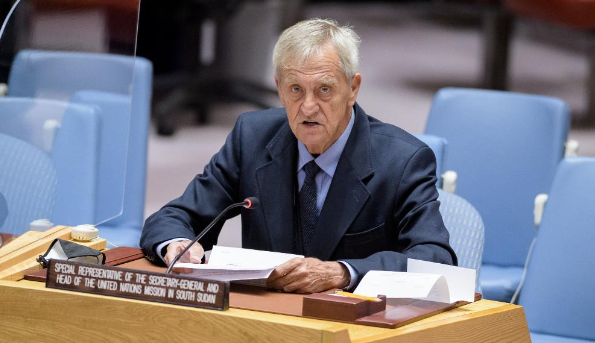The current year will be a “make-or-break” one for South Sudan, marking the start of a recent — and singular — 24-month extension of its transition process, a United Nations official told the Security Council on Monday.
Nicholas Haysom, Special Representative of the Secretary-General for South Sudan and Head of the United Nations Mission in South Sudan (UNMISS), said the Transitional Government recently recommitted to implementing the 2018 revitalized peace agreement. Noting the government’s promise that there will be no further extensions, he welcomed strides made to date, while also acknowledging some “slippage” against expected timelines.
He also warned against any further delays in implementing South Sudan’s Revitalized Peace Agreement.
“In a recent press briefing, the Transitional Government confirmed its commitment to implement the Peace Agreement by the timelines contained in the agreed Roadmap,” Haysom said. “In that same briefing, the government stated clearly that there would be no more extensions of the timelines. UNMISS welcomes this public commitment, acknowledges the limited progress achieved during the reporting period, but notes also the slippage in meeting the timelines set out in the Roadmap. Neither the stakeholders nor the international community is of a mind to contemplate further extensions.”
“Accordingly, we see 2023 as a “make or break” year and as a test for all parties to the peace agreement,” he added.
Several hurdles must be cleared to complete the final phase of implementation in 2024, he said, citing the need to draft a new constitution and fast-track preparations for the nation’s first-ever elections.
“There is a need to fast-track all preparatory work now, including the immediate constitution and operationalization of the Political Parties Council,” he said. “Most critically, UNMISS urges the finalization of the legal framework and the reconstitution of the National Elections Commission. The National Elections Commission has been a largely defunct body for nearly ten years, lacking human resources and material infrastructure. Key electoral choices must be determined soon. These steps cannot be shelved until 2024.”
Confirming that the United Nations has received a request from the Transitional Government to support the electoral process, he said creating an environment conducive to voting is among several key UNMISS priorities.
“The third priority is the expansion of civic and political space. This will be a defining legacy of the transitional period, as it constitutes the finishing line, the ultimate criteria by which the credibility of the electoral process will be judged, and more importantly, will set the foundation for a stable democracy that can avert further conflict,” he said. “In support of this expansion of civic and political space, UNMISS is engaging non-governmental organizations and political parties to ask the critical questions which must be expected of an appropriate political environment. We have taken note of the sentiments expressed at the recent International Conference on Women’s Transformative Leadership held in Juba, which has insisted on the space for women and girls to embrace their role as change agents.”
According to Haysom, there is also an urgent need to support the consolidation, strengthening, and deployment of the country’s Necessary Unified Forces, and tackle inter-communal violence erupting in several parts of the country.
“It will also be crucial to address South Sudan’s deteriorating and underfunded humanitarian situation, in which aid workers continue to grapple with insecurity, criminality, operational interference, and attacks,” he said.
The UNMISS chief also noted that the fifth challenge is tackling the sub-national violence that is manifesting itself through hotspots across the country, such as Upper Nile, Jonglei, and the Greater Pibor Administrative Area, the adjacent areas to Abyei, and the legacy of the conflict in Tambura, as well as cattle-related violence in the Equatorias.
“All of these conflicts increasingly present an ethnic or tribal dimension, and, as President Kiir noted in his New Year address, they threaten to unravel hard-won peace gains achieved so far,” he said. “We have been shocked at the recent cycle of revenge killings in Kajo-Keji, and elsewhere, the unacceptable practice of abductions of women and children, and the use of gender-based violence as a weapon of war.”
Haysom also said that another challenge South Sudan must face is the economic and humanitarian situation caused by climate shocks and conflict primarily.




